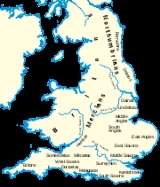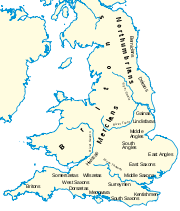
Cwichelm of Wessex
Encyclopedia

Anglo-Saxons
Anglo-Saxon is a term used by historians to designate the Germanic tribes who invaded and settled the south and east of Great Britain beginning in the early 5th century AD, and the period from their creation of the English nation to the Norman conquest. The Anglo-Saxon Era denotes the period of...
king of the Gewisse, a people in the upper Thames
River Thames
The River Thames flows through southern England. It is the longest river entirely in England and the second longest in the United Kingdom. While it is best known because its lower reaches flow through central London, the river flows alongside several other towns and cities, including Oxford,...
area who later created the kingdom of Wessex
Wessex
The Kingdom of Wessex or Kingdom of the West Saxons was an Anglo-Saxon kingdom of the West Saxons, in South West England, from the 6th century, until the emergence of a united English state in the 10th century, under the Wessex dynasty. It was to be an earldom after Canute the Great's conquest...
. He is usually counted among the Kings of Wessex.
Cwichelm is first mentioned in the Anglo-Saxon Chronicle
Anglo-Saxon Chronicle
The Anglo-Saxon Chronicle is a collection of annals in Old English chronicling the history of the Anglo-Saxons. The original manuscript of the Chronicle was created late in the 9th century, probably in Wessex, during the reign of Alfred the Great...
for 614: "This year Cynegils
Cynegils of Wessex
Cynegils was King of Wessex from c. 611 to c. 643.Cynegils is traditionally considered to have been King of Wessex, but the familiar kingdoms of the so-called Heptarchy had not yet formed from the patchwork of smaller kingdoms in his lifetime...
and Cwichelm fought at Beandun), and slew two thousand and forty-six of the Welsh."
Bede records that the attempted assassination of King Edwin of Deira, c. 626, was ordered by the West Saxon King Cwichelm, and does not mention Cynegils. In 628, Cynegils and Cwichelm fought King Penda
Penda of Mercia
Penda was a 7th-century King of Mercia, the Anglo-Saxon kingdom in what is today the English Midlands. A pagan at a time when Christianity was taking hold in many of the Anglo-Saxon kingdoms, Penda took over the Severn Valley in 628 following the Battle of Cirencester before participating in the...
at Cirencester
Cirencester
Cirencester is a market town in east Gloucestershire, England, 93 miles west northwest of London. Cirencester lies on the River Churn, a tributary of the River Thames, and is the largest town in the Cotswold District. It is the home of the Royal Agricultural College, the oldest agricultural...
. The Chronicle could be expected to report a victory, but does not, so it is likely that Penda was the victor.
The last mention of Cwichelm is for 636, when the Chronicle records: "This year King Cwichelm was baptized at Dorchester
Dorchester, Oxfordshire
Dorchester-on-Thames is a village and civil parish on the River Thame in Oxfordshire, about northwest of Wallingford and southeast of Oxford. Despite its name, Dorchester is not on the River Thames, but just above the Thame's confluence with it...
, and died the same year." Cynegils was also baptised at this time, by Bishop Birinus
Birinus
Birinus , venerated as a saint, was the first Bishop of Dorchester, and the "Apostle to the West Saxons".-Life and ministry:After Augustine of Canterbury performed initial conversions in England, Birinus, a Frank, came to the kingdoms of Wessex in 634, landing at the port of "Hamwic", now in the...
, with Oswald of Bernicia was his godfather. The final entry in the Anglo-Saxon Chronicle concerning Cwichelm, in 648, states: "This year Cenwalh
Cenwalh of Wessex
Cenwalh, also Cenwealh or Coenwalh, was King of Wessex from c. 643 to c. 645 and from c. 648 unto his death, according to the Anglo-Saxon Chronicle, in c. 672.-Penda and Anna:...
gave his relation Cuthred three thousand hides of land by Ashdown. Cuthred was the son of Cwichelm, Cwichelm of Cynegils." Cuthred may have been a sub-king under Cynegils and Cenwalh.
The relationship of Cwichelm to Cynegils, and the question of whether King Cwichelm was a son of Cynegils is disputed. If the 648 entry originally referred to Cuthred, son of Cwichelm, son of Cynegils, the use of the Latin
Latin
Latin is an Italic language originally spoken in Latium and Ancient Rome. It, along with most European languages, is a descendant of the ancient Proto-Indo-European language. Although it is considered a dead language, a number of scholars and members of the Christian clergy speak it fluently, and...
term propinquus (relation, kinsman) rather than nepos (grandson, nephew) is perhaps surprising. Barbara Yorke accepts that there was a single Cwichelm, and that he was Cynegils' son. D.P. Kirby notes that the evidence is weak, confused, and shows signs of later changes to the record. The evidence that Cwichelm was king of the Gewisse is unassailable, but the question of his ancestry and relationship to Cynegils, if any, is much less certain.

